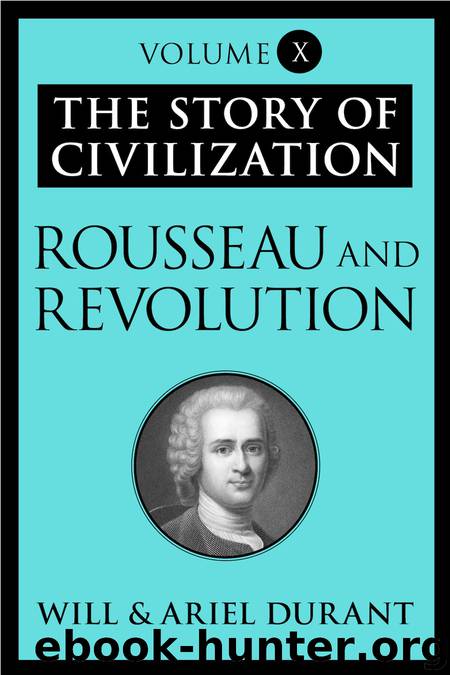Rousseau and Revolution by Will & Ariel Durant & Ariel Durant

Author:Will & Ariel Durant & Ariel Durant
Language: eng
Format: epub
Publisher: Simon and Schuster
Published: 1967-03-12T16:00:00+00:00
2. Götz and Werther
In Frankfurt the new licentiate grudgingly practiced law. He visited Darmstadt occasionally, and felt the influence of its cult of sentiment. He was now in a strong reaction against France, against French drama and its rigid rules, even against Voltaire. More and more he relished Shakespeare, who had put the nature of man, lawful or lawless, upon the stage. In this mood, and in the exuberant vigor of youth, he was ripe for Sturm und Drang. He sympathized with its rejection of authority, its exaltation of instinct over intellect, of the heroic individual over the tradition-imprisoned masses. And so, in 1772-73, he wrote G ötz von Berlichingen.
It was a remarkable performance for a lad of twenty-three: a drama uniting war, love, and treachery in a story warm with zeal for liberty, exuding vitality, and holding the interest from beginning to end. Götz was a knight whose right hand had been shot off in battle when he was twenty-four (1504); an iron hand had been attached to his arm, and with it he wielded his sword as lethally as before. Refusing to acknowledge any overlord but the Emperor, he became one of those “robber barons” who, in the name of freedom, claimed full authority on their lands, even to pillaging wayfarers and waging private war. In 1495 Emperor Maximilian I had issued an edict against private wars, under the double penalty of ban by the Empire and excommunication by the Church. Götz of the Iron Hand rejected the ban as contravening traditional rights, and the play turned at first on the struggle between the rebel knight and the Prince-Bishop of Bamberg. Goethe, loving women much more than war, let the center of interest pass to Adelaide von Walldorf, whose beauty and wealth fired a dozen men with reckless passion. For her Adelbert von Weislingen, another “free” knight, broke his alliance with Götz and his troth with Gótz’s sister Maria, and went over to the Bishop. Perhaps in Weislingen’s vacillating love Goethe remembered his own unfaithfulness. He sent a copy of the play to Friederike by a friend, saying, “Poor Friederike will feel somewhat consoled when she sees that the faithless lover is poisoned.”35
The author colored history to suit his drama; Gottfried von Berlichingen was not so noble and magnanimous as Goethe’s Götz; but such emendations are poetic licenses, like tortured rhymes. Forgivable, too, is the rough, wild speech which Goethe ascribed to his hero as echoing virility. When the play was produced in Berlin (1774) Frederick the Great condemned it as a “detestable imitation” of the “barbarism” that he, like Voltaire, saw in Shakespeare, and he called upon German dramatists to seek their models in France. Herder at first agreed with Frederick, and told Goethe, “Shakespeare has ruined you”;36 but he sent the published version to his friends with high praise: “You have hours of enchantment before you. There is an uncommon degree of authentic German power, depth, and sincerity in the piece, though now and then it is merely an intellectual exercise.
Download
This site does not store any files on its server. We only index and link to content provided by other sites. Please contact the content providers to delete copyright contents if any and email us, we'll remove relevant links or contents immediately.
| Africa | Americas |
| Arctic & Antarctica | Asia |
| Australia & Oceania | Europe |
| Middle East | Russia |
| United States | World |
| Ancient Civilizations | Military |
| Historical Study & Educational Resources |
Elizabeth by Philippa Jones(2195)
Mary Boleyn by Alison Weir(1876)
Traitors of the Tower by Alison Weir(1622)
A Journal of the Plague Year (Oxford World's Classics) by Daniel Defoe(1509)
Notes From a Small Island by Bill Bryson(1386)
Life of Pi by Yann Martel(1347)
A Short History of England by Simon Jenkins(1319)
Queen Isabella by Alison Weir(1304)
Moon Tiger by Penelope Lively(1257)
Eleanor of Aquitaine by Marion Meade(1256)
The Real Middle Earth by Brian Bates(1235)
London Under by Peter Ackroyd(1232)
American Idol by Richard Rushfield(1132)
Her Majesty's Spymaster by Stephen Budiansky(1079)
Tudors Versus Stewarts by Linda Porter(1076)
Albion by Peter Ackroyd(1066)
The Creation of Anne Boleyn by Susan Bordo(1054)
Cromwell, Our Chief Of Men by Fraser Antonia(1022)
Children Of England: The Heirs of King Henry VIII 1547-1558 by Weir Alison(982)
